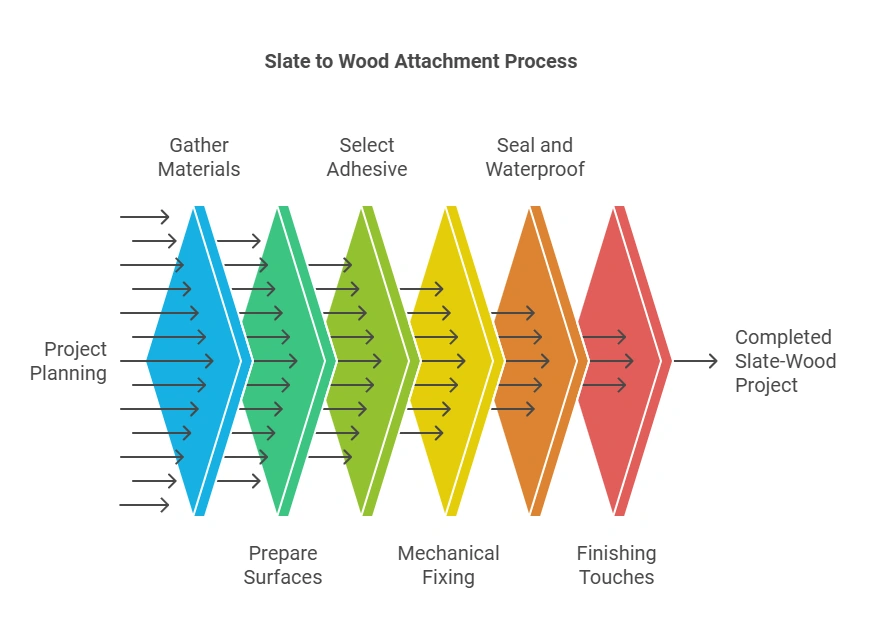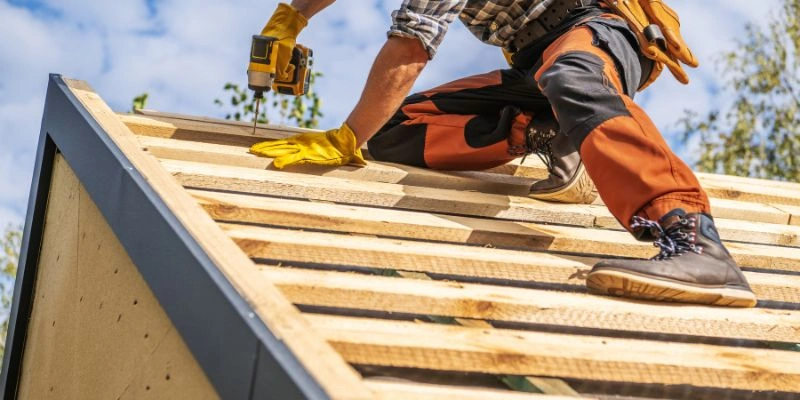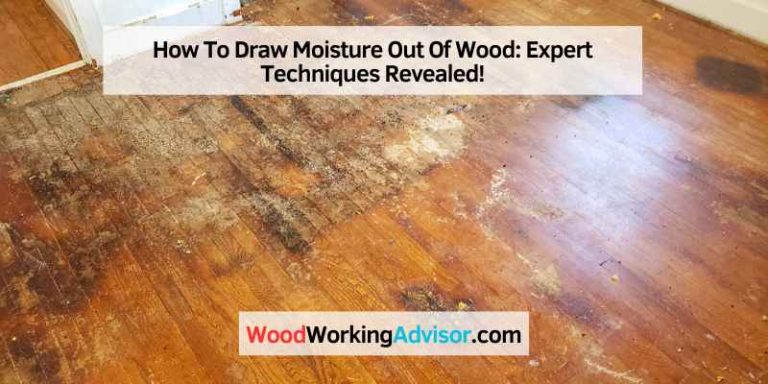How to Attach Slate to Wood: Simple & Secure Methods
To attach slate to wood, use a strong adhesive like thin-set mortar or construction adhesive. Ensure both surfaces are clean and dry before applying the adhesive.
Slate is a popular choice for various home projects due to its natural beauty and durability. Attaching slate to wood can enhance aesthetics and provide a sturdy surface for countertops, tables, or wall features. Selecting the right adhesive is crucial for a long-lasting bond.
Proper preparation of both the slate and wood surfaces will ensure optimal results. This guide will walk you through the essential steps to achieve a secure attachment. Follow these tips to create a stunning and functional slate installation that stands the test of time. Your project will benefit from careful planning and execution.
Introduction To Slate And Wood Projects
Slate and wood create a beautiful combination in projects. The natural textures of both materials enhance any space. Slate adds a rich color palette that complements wood’s warm tones.
Common uses for slate and wood include:
- Tabletops: Unique and durable surfaces.
- Wall Art: Stunning focal points for any room.
- Coasters: Functional and stylish additions.
- Outdoor Decor: Weather-resistant options for gardens.
This combination is perfect for creative DIY projects. It allows for endless possibilities in design and function.
Materials Needed For Slate Attachment
To attach slate to wood, gather essential materials first. Different types of slate include natural slate, ceramic slate, and engineered slate. Each type has unique properties and looks.
Choosing the right wood is important. Common options are plywood, softwood, and hardwood. Ensure the wood is strong and dry.
Essential tools and supplies include:
- Measuring tape for accurate dimensions
- Construction adhesive for strong bonding
- Notched trowel for spreading adhesive evenly
- Level to ensure a flat surface
- Grout for finishing gaps

Preparation Steps Before Attachment
Start by cleaning the wood surface. Use a damp cloth to remove dust and dirt. This will help the slate stick better.
Make sure the surface is dry before proceeding. Moisture can cause problems later. After cleaning, measure the area where the slate will go.
Use a tape measure to get accurate dimensions. Mark the slate pieces accordingly. Cut the slate with a wet saw for smooth edges.
Always wear safety gear when cutting. This protects eyes and hands from injury. Check each piece for sharp edges before installation.
Adhesive Selection For Slate Attachment
Choosing the right adhesive is crucial for attaching slate to wood. Each adhesive has its own benefits and drawbacks. Below are the pros and cons of different adhesives:
| Adhesive Type | Pros | Cons |
|---|---|---|
| Epoxy | Strong bond, water-resistant | Long curing time, can be messy |
| Construction Adhesive | Easy to use, strong initial hold | Not waterproof, may not cure well |
| Thinset Mortar | Great for outdoor use, moisture-resistant | Requires skill to apply, longer setup time |
Application techniques matter too. Clean the surfaces before applying adhesive. Use a notched trowel for even distribution. Press the slate firmly into place. Allow the adhesive to cure fully for the best results.
Mechanical Fixing Methods
Attaching slate to wood can be done with screws and nails. Using galvanized screws prevents rust. Choose screws that are at least 1.5 inches long for better grip. Pilot holes help avoid splitting the slate. Use a drill to make these holes. Choose stainless steel nails for a clean finish. Nails should be 2 inches long for stability.
Incorporating brackets and clamps adds extra support. Metal brackets hold the slate firmly in place. Use L-shaped brackets at the corners for better strength. Clamps can secure the slate while it dries. Ensure the clamps do not damage the surface. Proper spacing of brackets helps distribute weight evenly.
Sealing And Waterproofing
Choosing the right sealant is important for attaching slate to wood. Look for sealants that are waterproof and strong. Silicone and polyurethane sealants are great options. They can protect your slate from moisture and wear.
Follow these steps for the application process:
- Clean the wood surface well.
- Apply the sealant evenly.
- Press the slate firmly into the sealant.
- Allow it to dry completely.
This will ensure a strong bond between the slate and wood. Proper sealing helps the slate last longer.
Finishing Touches
Start by sanding the surface of the wood. This helps create a smooth finish. Use medium-grit sandpaper for best results. Follow with fine-grit sandpaper to remove any rough edges.
Next, apply a quality paint or finish. Choose a color that complements the slate. A sealer can protect the wood and enhance its look. Let the paint dry completely before proceeding.
For decorative edging, consider using trim or molding. This adds a nice touch to the project. Choose materials that match or contrast with the slate. Ensure edges are secure for a polished finish.
Maintenance Tips For Slate-wood Attachments
Regular cleaning is essential for maintaining slate-wood attachments. Use a soft cloth to remove dirt. Avoid using harsh chemicals that can damage the surface. Clean spills quickly to prevent stains.
Damage prevention helps keep your slate in great condition. Place coasters under heavy objects to avoid scratches. Use felt pads on furniture legs to prevent gouges. Avoid exposing slate to extreme temperatures.
Repair techniques are important for fixing any damage. For small cracks, use a slate repair kit. Apply the adhesive carefully and let it dry completely. For larger issues, consult a professional for help.
Creative Ideas For Slate On Wood
Using slate on wood can create stunning home decor. Consider a slate backsplash in your kitchen. It adds a rustic touch and is easy to clean.
Try slate coasters on a wooden table. They protect the wood and look stylish. Slate trays can hold candles or plants, enhancing your decor.
For outdoor applications, slate can be used for garden paths. It blends beautifully with natural surroundings. Slate planters can showcase flowers or herbs.
Creating a slate tabletop on a wooden base is another unique idea. It makes for a perfect outdoor dining space. Use slate to make signs for your garden or patio.
Safety Considerations During Installation
Safety is very important during installation. Use proper Personal Protective Equipment (PPE) to stay safe. Always wear safety goggles, gloves, and a dust mask. These items protect your eyes, hands, and lungs.
Proper handling of materials is crucial. Slate can be heavy and break easily. Always lift with your legs, not your back. Carry slate pieces close to your body. Avoid dropping them to prevent injuries.
Store slate in a safe place. Keep it on a flat surface and away from edges. This prevents accidents and damage.
Troubleshooting Common Issues
Adhesive failures often happen due to improper application. Ensure the surface is clean and dry. Use the right type of adhesive for slate and wood. Follow the manufacturer’s instructions carefully. If the adhesive does not cure properly, try a different brand or type.
Wood and slate expansion can cause issues. Both materials expand and contract with temperature changes. Choose an adhesive that allows some movement. This helps prevent cracks or detachment. Regularly check for signs of separation. Early detection can save time and money.

Frequently Asked Questions
How Do You Prepare Wood For Slate Attachment?
Preparing wood for slate attachment involves cleaning and sanding the surface. Ensure the wood is dry and free from dust or debris. Use a primer or adhesive suitable for both wood and slate to enhance bonding. Proper preparation ensures a strong and lasting connection between materials.
What Adhesive Is Best For Slate And Wood?
The best adhesive for attaching slate to wood is a high-quality construction adhesive or a specialized tile adhesive. These adhesives provide strong bonding while accommodating any movement in the materials. Always check the manufacturer’s recommendations for compatibility and drying times for optimal results.
Can I Use Nails To Attach Slate To Wood?
Using nails to attach slate to wood is not recommended. Nails can compromise the integrity of the slate and may cause cracking. Instead, opt for adhesive or screws specifically designed for stone materials. These methods ensure a more secure and durable attachment.
How Long Does It Take For Slate To Bond?
The bonding time for slate attached to wood varies by adhesive used. Most adhesives require 24 to 48 hours to cure fully. Factors like temperature and humidity can also affect curing time. Always follow the manufacturer’s guidelines for the best results.
Conclusion
Attaching slate to wood can enhance both aesthetics and durability. Follow the steps outlined in this guide for a successful installation. Always choose the right adhesive and prepare your surfaces properly. With patience and care, you’ll achieve a beautiful finish that lasts for years.
Enjoy your new slate project!







